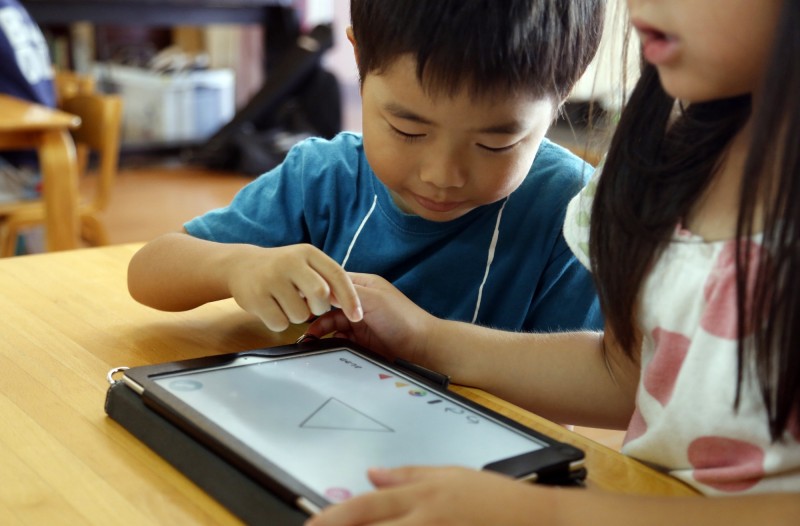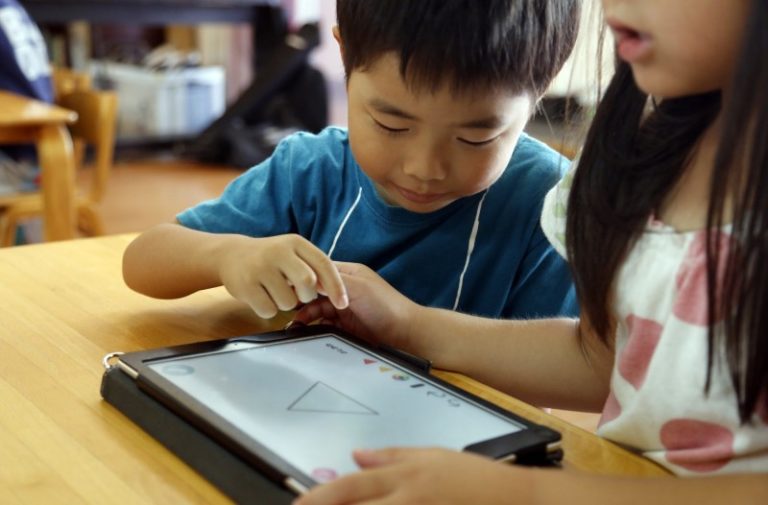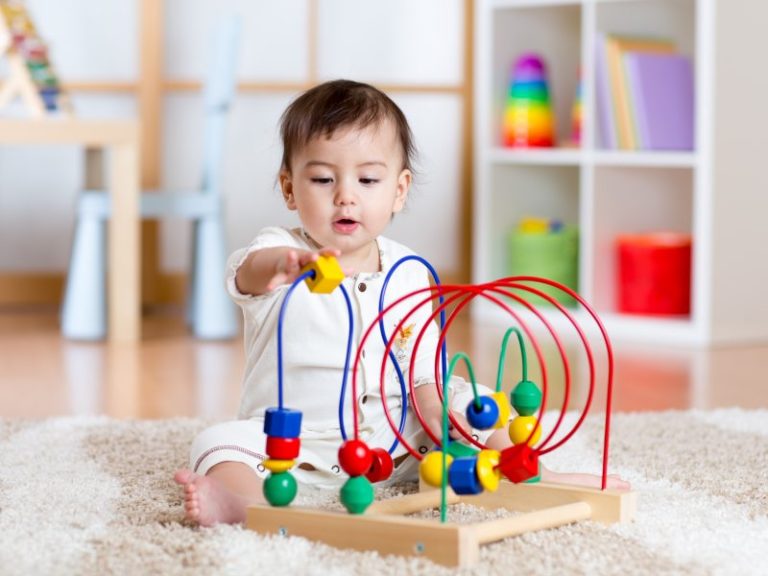Month: September 2023
Is an electronic pacifier a quality toy?
- Post author By system
- Post date 01/09/2023
- Sticky post

Is an electronic pacifier a quality toy?

Written by: Speech Therapist, Lee Wing Yan
With the advancement of technology and material abundance nowadays, it’s not hard to see that tablets are being used as “electronic pacifiers” for young children. Regardless of the occasion, whenever parents bring out this “electronic pacifier” and play YouTube videos, children sit quietly, and adults can focus on their tasks. Since tablets and smartphones can calm young children and provide educational games and videos for learning, does that mean they are quality toys?
The key to selecting “quality toys” lies in whether young children can genuinely learn from them. Indeed, educational videos and interactive games can offer the cognitive concepts that preschoolers need to learn, but we also need to consider how preschoolers actually learn language.
Recent foreign research explores the impact of the parent-child interaction pattern on language development one year later (i.e., at age 3). The study found that the presence of “connectedness” between parents and children during interactions most influenced the child’s subsequent language development, including whether both parties participated in the same activity in turns. Additionally, children’s learning of verbs, such as “I eat” in “eat” or “Mom drinks water” in “drink,” directly affects their future language development (from the three examples above, it’s clear that to form complete sentences, children need to recognize a certain number of verbs).
Seizing everyday life opportunities to teach verbs through activities
So, can tablets and smartphones achieve the mentioned “connectedness”? Based on my daily observations, children tend to use tablets and smartphones alone, and they resist it when parents want to intervene. Furthermore, most of what children learn from videos are limited to English alphabets, counting, nursery rhymes, cartoon character names, or specific dialogues from cartoon characters. But what about verbs? Verbs are often easily overlooked in videos because children can learn them more effectively by doing them in real situations! For example, teaching a child the action of “brushing teeth” doesn’t it involve singing a nursery rhyme “Up and down the brush,” repeatedly emphasizing the action of “brushing,” and brushing teeth together with them? In daily life, whether during bath time, cooking, playing with toys, or going to the park, parents can take the opportunity to teach relevant verbs used in different scenarios through interactive activities.

Furthermore, research also indicates that the quality of interaction between parents and young children during play and reading, including the vocabulary adults input to children and the spontaneous “baby talk” from children, is higher compared to when using tablets and smartphones. Scholars generally believe that young children’s language learning primarily occurs through interaction with people. Therefore, if young children excessively use tablets and smartphones, reducing interaction with family members, it may be detrimental to their language development.
So, what defines a “quality toy”? Whether it’s choosing tablets, smartphones, or traditional toys like dolls, puzzles, and toy cars, the most important aspect to consider is:
Does it promote interaction and communication between parents and children?
Does it replace original opportunities for parent-child interaction?
In parent-child interaction and communication, parents can use various communication techniques to enrich the child’s language environment. These techniques have been mentioned in the previous article on “Four Communication Styles.” Toys are, in fact, just tools. Through toys and quality interaction, we aim to enhance young children’s language development.
How to cultivate a child’s manners? Respect and attention are essential
- Post author By system
- Post date 01/09/2023
- No Comments on How to cultivate a child’s manners? Respect and attention are essential
- Sticky post

How to cultivate a child’s manners? Respect and attention are essential

Written by: Education expert, Principal Cheung Wai jing
At a talent recruitment event for a large multinational company, both Siu Cheung and Siu Choi successfully passed the initial and follow-up interviews. They stood out from over 100 competitors. Whether it was written tests or communication skills, both were equally impressive, leaving the human resources department’s evaluators in a dilemma, as the company would only hire one person.
In the end, the company manager decided to personally interview both candidates. Surprisingly, after just a few minutes, the manager chose to hire Siu Cheung. When asked for the reason, the manager candidly stated, “The reason is simple. When I was speaking to them, Siu Cheung maintained eye contact with me the whole time, while Siu Choi was looking around, indicating that he wasn’t good at actively listening to others. Being adept at listening and respecting clients is a crucial requirement for a sales supervisor.”
Expressing Sincerity and Respect through Eye Contact
This example illustrates a straightforward lesson: eyes are the windows to the soul, and people use their gaze to convey a range of emotions such as respect, attention, disdain, and indifference. Therefore, maintaining consistent eye contact during conversations signifies your sincerity. Moreover, those who can attentively focus on others’ words without shifting their gaze will naturally earn gratitude and respect from others.
Schools often organize activities centered around the theme of “politeness” to encourage students to be courteous to others. “Others” includes not only family members, elders, teachers, and fellow students but also unfamiliar people. Children should learn early on about polite phrases like “good morning” and “thank you,” but many still don’t proactively greet others, let alone observe other daily life etiquette. Schools focus on teaching students how to behave politely when interacting with teachers and peers in the school setting; the rest relies on family education.

The example of “job hunting” mentioned above might not be applicable to elementary school students for the time being, but they also frequently have opportunities for interviews. If they want to leave a good impression on others, children must learn to use their eyes to show their attention and respect when conversing with others. Therefore, parents need to teach children the skills and art of listening. Of course, when parents listen to their children, they should also give them appropriate respect and attention. This way, children will learn that politeness in interpersonal interactions knows no age or status boundaries. Here are three listening tips:
- When listening to someone, avoid looking around and instead focus on the person’s eyes.
- When you understand or share the same sentiment, use your eyes to communicate and show agreement.
- Gazing at someone doesn’t mean staring fixedly at them; doing so can actually come across as impolite.
In literature, characters are often described as having “eyes that speak.” In reality, everyone has eyes like that; as long as we utilize them well, they can be more persuasive than the words we speak.
Happy kindergarten, how about elementary school?
- Post author By system
- Post date 01/09/2023
- No Comments on Happy kindergarten, how about elementary school?
- Sticky post

Happy kindergarten, how about elementary school?

Written by: Octopus parent, Mr. Leung Wing Lok.
I’ve heard many parents share their experiences, and within the three years of kindergarten, the biggest concern is the transition to elementary school. How much should be done for the child? Should interview classes be arranged? Should extra English lessons or etiquette coaching (not a typo, there are actually training classes for etiquette) be arranged? Among the myriad of skills, is having sixteen talents out of eighteen enough? Or should the child learn niche skills to stand out, like magic tricks or acrobatics? Both parents and children are busy enjoying quality bonding time, especially when every activity has a purpose. As a result, attitudes change, and the child might lose interest in extracurricular classes.
Parents worry about selecting the preferred elementary school and creating resumes.
Especially for K3 students entering the “peak school application season” in June, parents and children face the decision of whether to apply to 10 or 8 elementary schools. As a father, you may hope to only apply to one or two preferred elementary schools, but can you bear the responsibility of “not providing enough education” for your child?

Another challenge is undoubtedly creating the resume, how elaborate should it be? Many schools explicitly state that they accept a maximum of only 4 pages, but you see other parents’ “work reports” for their children that are as thick as prospectuses, with an exquisite level of presentation rivaling Apple’s brochures. You glance at your child, he might not stand out particularly, nor is he an incredibly handsome “lad.” Do you have the courage to limit the resume to just 4 pages?
The choice between “entering elementary school” and “becoming a person.”
What’s most precious isn’t how outstanding the “academic performance” is, but rather the ability to interact with others, to be polite. Of course, what I’m most grateful for is when the teacher specifically instructed my son to “love Daddy, Daddy works hard,” transforming me in my child’s eyes from a “rarely seen person” to a “cherished person to meet.” These teachings might not necessarily aid in entering elementary school, but they hold everlasting value in the parent-child relationship.
Reflecting back, did kindergarten primarily cultivate your child for “entering elementary school,” or for “becoming a person”? Facing the same question, as a parent, is your goal of educating your child solely for the purpose of “entering elementary school”?
